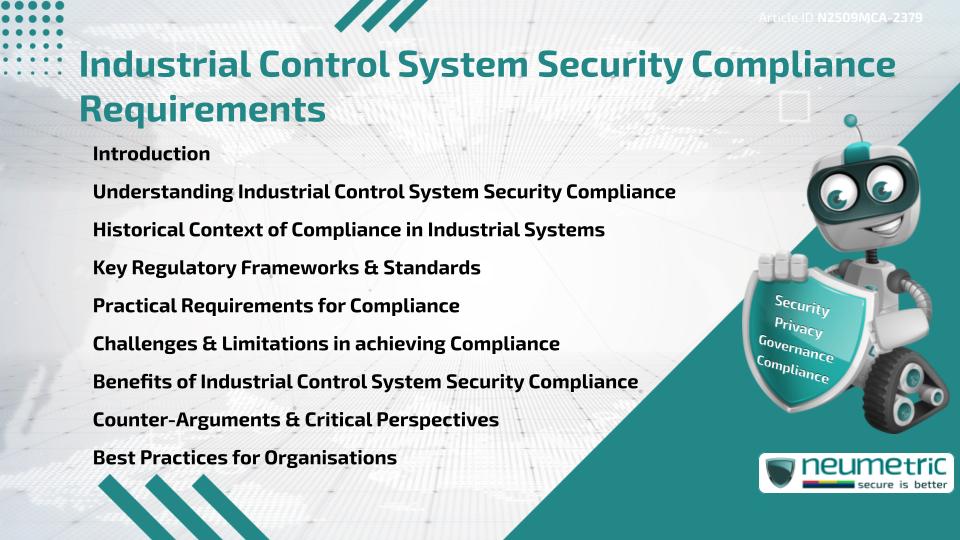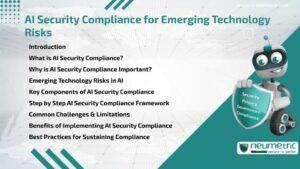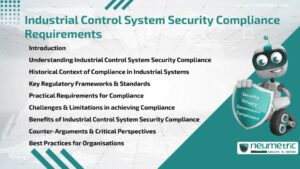Table of Contents
ToggleIntroduction
Industrial control system security compliance is essential for safeguarding critical infrastructure, such as power plants, Manufacturing facilities & water treatment systems. Compliance ensures that Organisations follow regulatory frameworks & Industry Standards to mitigate Risks from cyberattacks, unauthorized access & system failures. Key frameworks such as NIST, ISA/IEC 62443 & NERC CIP shape compliance measures globally. Achieving compliance requires not only adopting technical controls but also aligning Policies, training & Continuous Monitoring. This article explores the history, requirements, challenges, benefits & critical perspectives on industrial control system security compliance.
Understanding Industrial Control System Security Compliance
Industrial control system security compliance refers to the process of meeting specific standards, regulations & Policies that protect supervisory control & data acquisition [SCADA] systems & distributed control systems [DCS]. It ensures that Organisations implement preventive & detective measures against cyber Risks. Compliance is not only a legal or regulatory necessity but also a vital practice to protect public safety, operational reliability & economic stability.
Historical Context of Compliance in Industrial Systems
The need for industrial control system security compliance gained attention in the late 20th century as systems became increasingly connected to corporate networks & the internet. Events such as the Stuxnet attack highlighted Vulnerabilities in industrial environments, emphasizing the need for structured regulations. Over time, governments & international bodies introduced frameworks to standardize security practices across industries.
Key Regulatory Frameworks & Standards
Several frameworks guide industrial control system security compliance:
- NIST Cybersecurity Framework: Provides voluntary but widely adopted Best Practices for critical infrastructure.
- ISA/IEC 62443: A series of standards focusing on security for industrial automation & control systems.
- NERC CIP: Mandatory standards for securing bulk electric systems in North America.
- ISO/IEC 27001: A broader Information Security management system Framework that also applies to industrial contexts.
- European NIS Directive: Ensures a high level of network & Information Security across the European Union.
These frameworks set technical, procedural & Governance-based requirements for Organisations.
Practical Requirements for Compliance
Organisations pursuing industrial control system security compliance must implement measures such as:
- Network segmentation & Access Controls
- Continuous Vulnerability management & patching
- Incident Response planning & testing
- Employee Training & awareness
- Audit logging & monitoring
- Third Party Risk Management
These requirements must be embedded into daily operations rather than treated as one-time efforts.
Challenges & Limitations in achieving Compliance
Compliance presents challenges such as legacy systems that cannot be easily updated, high costs of implementation & potential downtime during upgrades. Additionally, compliance frameworks often lag behind evolving Cyber Threats, leaving gaps that Organisations must address proactively. Smaller Organisations may also struggle with resource constraints while striving to meet compliance.
Benefits of Industrial Control System Security Compliance
Despite challenges, industrial control system security compliance provides tangible benefits. It reduces the Likelihood of costly cyberattacks, improves resilience against disruptions & enhances Customer & Stakeholder trust. Compliance also helps Organisations avoid legal penalties & reputational damage. Importantly, it supports the stability of national critical infrastructure.
Counter-Arguments & Critical Perspectives
Some argue that compliance alone does not guarantee security. Organisations might focus on “checking boxes” instead of developing a culture of security. Overemphasis on compliance can also lead to rigid processes that hinder innovation. Therefore, compliance should be seen as a foundation, not a complete solution, to securing industrial systems.
Best Practices for Organisations
To strengthen industrial control system security compliance, Organisations should:
- Regularly review & update Policies
- Integrate security into system design from the outset
- Foster collaboration between IT & operational technology teams
- Conduct frequent Risk Assessments
- Engage in industry information-sharing initiatives
These practices ensure compliance translates into real-world security improvements.
Takeaways
Industrial control system security compliance is not only about meeting regulatory mandates but also about protecting people, assets & national infrastructure. By understanding frameworks, embracing Best Practices & balancing compliance with proactive security, Organisations can create safer & more resilient operations.
FAQ
What is industrial control system security compliance?
It is the process of meeting regulatory & Industry Standards to secure industrial systems against Cyber Threats & operational Risks.
Why is industrial control system security compliance important?
It protects critical infrastructure, ensures safety & prevents costly disruptions caused by cyberattacks or system failures.
Which frameworks are most relevant to industrial control system security compliance?
NIST, ISA/IEC 62443, NERC CIP, ISO/IEC 27001 & the European NIS Directive are the most widely recognized.
What challenges do Organisations face in achieving compliance?
Challenges include outdated legacy systems, high costs, evolving Cyber Threats & limited resources in smaller Organisations.
Does compliance guarantee security?
No, compliance sets minimum requirements, but Organisations must go beyond to build a strong security culture.
How does compliance benefit Organisations?
Compliance reduces Risks, strengthens resilience, enhances trust & helps avoid legal & Financial penalties.
What role do Employees play in compliance?
Employees are critical; training & awareness ensure they follow secure practices & detect potential Risks early.
What are Best Practices for achieving compliance?
Best Practices include policy reviews, system design integration, IT-OT collaboration, regular Risk Assessments & industry information-sharing.
Need help for Security, Privacy, Governance & VAPT?
Neumetric provides organisations the necessary help to achieve their Cybersecurity, Compliance, Governance, Privacy, Certifications & Pentesting needs.
Organisations & Businesses, specifically those which provide SaaS & AI Solutions in the Fintech, BFSI & other regulated sectors, usually need a Cybersecurity Partner for meeting & maintaining the ongoing Security & Privacy needs & requirements of their Enterprise Clients & Privacy conscious Customers.
SOC 2, ISO 27001, ISO 42001, NIST, HIPAA, HECVAT, EU GDPR are some of the Frameworks that are served by Fusion – a SaaS, multimodular, multitenant, centralised, automated, Cybersecurity & Compliance Management system.
Neumetric also provides Expert Services for technical security which covers VAPT for Web Applications, APIs, iOS & Android Mobile Apps, Security Testing for AWS & other Cloud Environments & Cloud Infrastructure & other similar scopes.
Reach out to us by Email or filling out the Contact Form…





